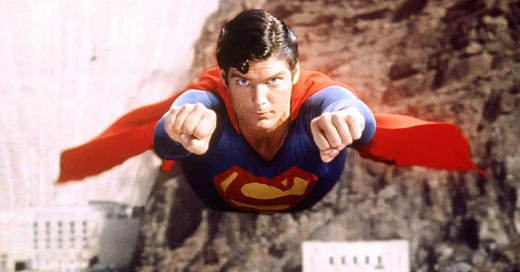'Super/Man' puts Christopher Reeve's real heroism on display
Poignant documentary reveals intimate details of actor's struggle
If George Bernard Shaw hadn’t snagged it first, the perfect title for the documentary “Super/Man: The Christopher Reeve Story” would have been “Man and Superman.”
Because Reeve was both. He was the square-jawed, blue-eyed hero who, with apologies to Henry Cavill and David Corenswet, will forever embody the Man of Steel in cinema. And he was a man, a Juilliard-trained actor whose courageous fight after a horse-riding accident left him fully paralyzed somehow eclipsed his big-screen exploits.
The documentary, directed by Ian Bonhote and Peter Ettedgui, wisely follows both tracks in Reeve’s life. His unlikely ascent to movie stardom is stirring, but the real story is behind the scenes, with family and friends (especially his children) movingly recounting the story of a charismatic, outgoing, somewhat flawed man who exhibited true heroism in the worst of circumstances.
Despite being hired to play the greatest superhero ever, Reeve was no handsome lunkhead, but a sharp, gifted New York theater actor. While 1978’s “Superman” was full of spectacle, it’s his surprisingly humane and even witty performance as Superman that makes the movie so rewatchable now. A clip recently went around social media of Reeve transforming from Clark Kent to Superman and back again in a single shot, using not visual effects but expressions, posture, and emotion. You know – acting.
It must have rankled Reeve to be dismissed as a lightweight by critics, and it didn’t help that his own father, whose approval he futilely sought all his life, coolly dismissed his achievements. After two great “Superman” movies and two lousy ones, Reeve’s star quickly dimmed, and while he worked steadily in the ‘80s and ‘90s (he’s very funny in “Speechless”), his interests seemed to turn to spending time with his family skiing, sailing and riding.
And then the accident happened in 1995 that left him paralyzed from the neck down. The film is unsparing about the depressive, even suicidal state of his mind at first. His wife Dana Reeve and kids were able to pull him out of it – Reeve says he would have let go if Dana hadn’t said the words “You’re still you” to him in the ICU.
From there, Reeve used his celebrity status to champion for disability rights and research into spinal cord injuries, work that his foundation continued after his death in 2004. And internally, being forced to stop being in motion for so much of his life allowed him to appreciate life more. The audio clips of Reeve from interviews and his audiobook are tremendously moving. (In a cruel twist of fate, Dana died of lung cancer 18 months after her husband.)
The one stylistic touch in “Super/Man” that rankled me a little were interstitial images that showed Reeve as a godlike, Superman-esque being floating high above the earth, like an Alex Ross comic book cover. I get that his Superman may be forever a part of pop culture history, and deservedly so. But the real hero in Reeve’s life story was back on Earth, lying in a hospital bed.
“Super/Man” is now playing in theaters. In Madison, it’s playing at Marcus Point, Marcus Palace and AMC Fitchburg 18.




No love for my man Brandon Routh?
Fromtheyardtothearthouse.substack.com
I love Reeves and always enjoyed reading about his friendship with Robin Williams. I'll have to check this one out. Thanks, Rob!